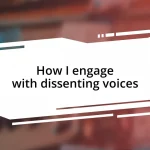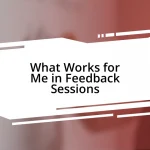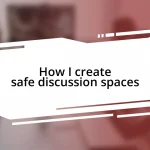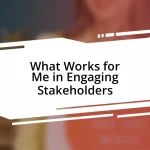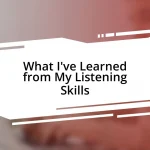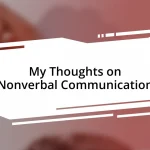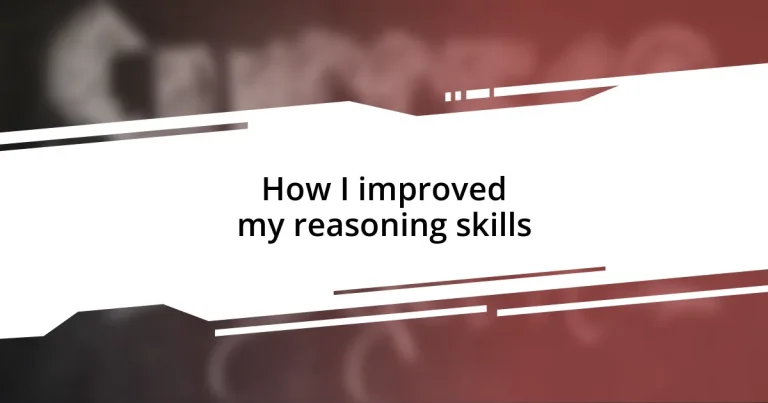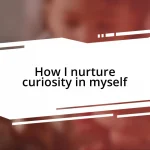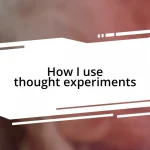Key takeaways:
- Reasoning skills involve critical and creative thinking, enhancing decision-making and interpersonal empathy.
- Assessing current abilities through self-evaluation, peer feedback, and structured assessments helps identify strengths and areas for improvement.
- Engaging in debates, critical reading, and reflective journaling cultivates deeper reasoning skills and challenges assumptions.
- Applying reasoning in daily life, such as during decision-making and social interactions, promotes personal growth and improved communication.
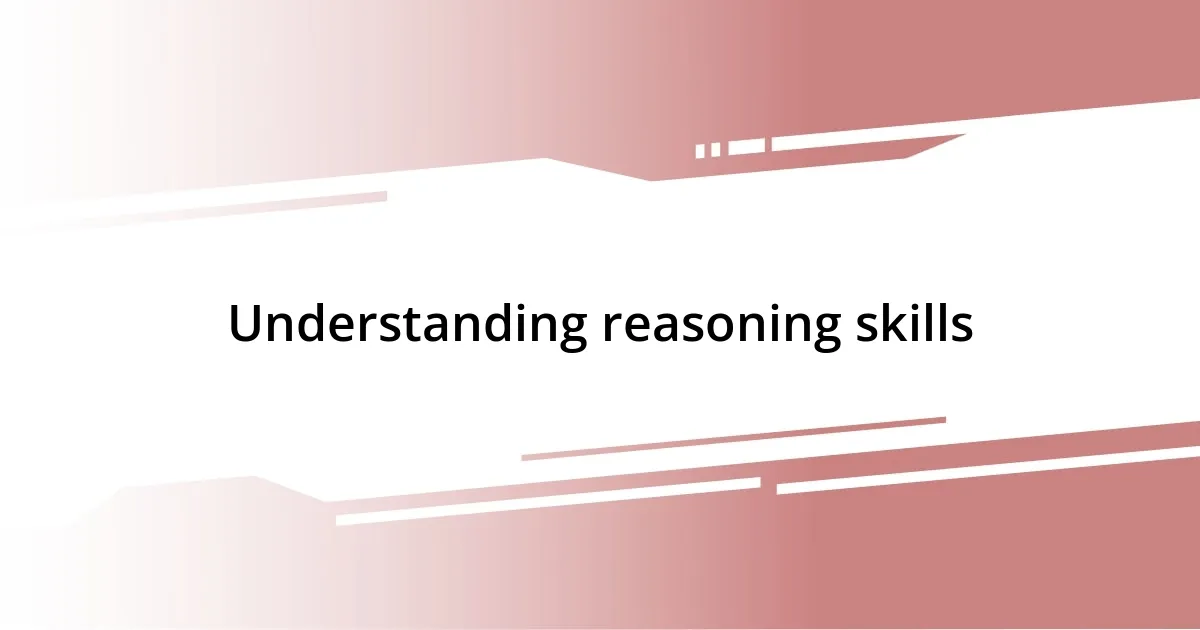
Understanding reasoning skills
Reasoning skills are the mental processes we use to think, analyze, and draw conclusions from information. I remember when I first encountered a complex problem in my studies; I felt overwhelmed, but breaking it down into smaller parts really helped me see the connections more clearly. Isn’t it fascinating how our minds can navigate through chaos when we harness our reasoning abilities?
When we talk about reasoning, it encompasses both critical and creative thinking. I once participated in a debate where I realized that the ability to understand multiple perspectives wasn’t just a skill; it was a game changer. Have you ever found yourself considering someone else’s point of view and suddenly feeling a rush of empathy? That’s reasoning at work, enriching our interactions and enhancing our decision-making.
Developing reasoning skills also means being open to questioning our own beliefs. I vividly recall a time when I challenged my long-held assumptions during a discussion with a friend. The realization that I could be wrong was an eye-opener. Doesn’t that vulnerability encourage growth? Understanding reasoning isn’t simply about logic; it’s about engaging with ideas that stretch our thinking and transform how we see the world.
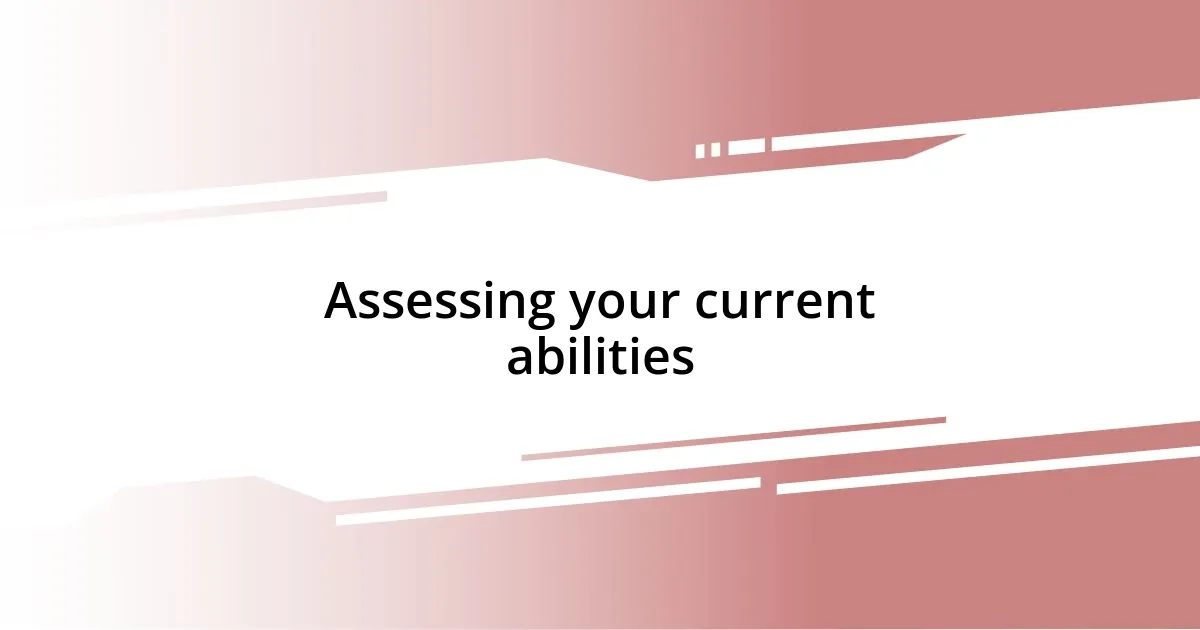
Assessing your current abilities
Assessing your current abilities begins with a reflective self-evaluation. I remember sitting down one afternoon with a blank notepad, trying to chart my strengths and weaknesses. It was an eye-opening experience to pinpoint areas where my reasoning shone and where it fell short. Have you ever felt that rush of clarity after laying everything out on paper?
Once you’ve documented your thoughts, it’s essential to seek feedback from others. I reached out to a colleague whose opinion I valued, and their insights helped me see blind spots I hadn’t considered. Getting an external perspective can add depth to your self-assessment. What about you? Have you asked someone for their honest take on your reasoning skills?
Lastly, consider using structured assessments or quizzes designed to evaluate reasoning abilities. I found a few online tools that provided instant feedback on my critical thinking prowess. These assessments not only gauge your current skills but also highlight specific areas for improvement. They can be a fun way to track progress over time!
| Method | Description |
|---|---|
| Self-Evaluation | Reflecting on personal strengths and weaknesses in reasoning. |
| Peer Feedback | Gathering insights from trusted colleagues for 360-degree feedback. |
| Structured Assessments | Taking quizzes that evaluate critical and creative thinking skills. |
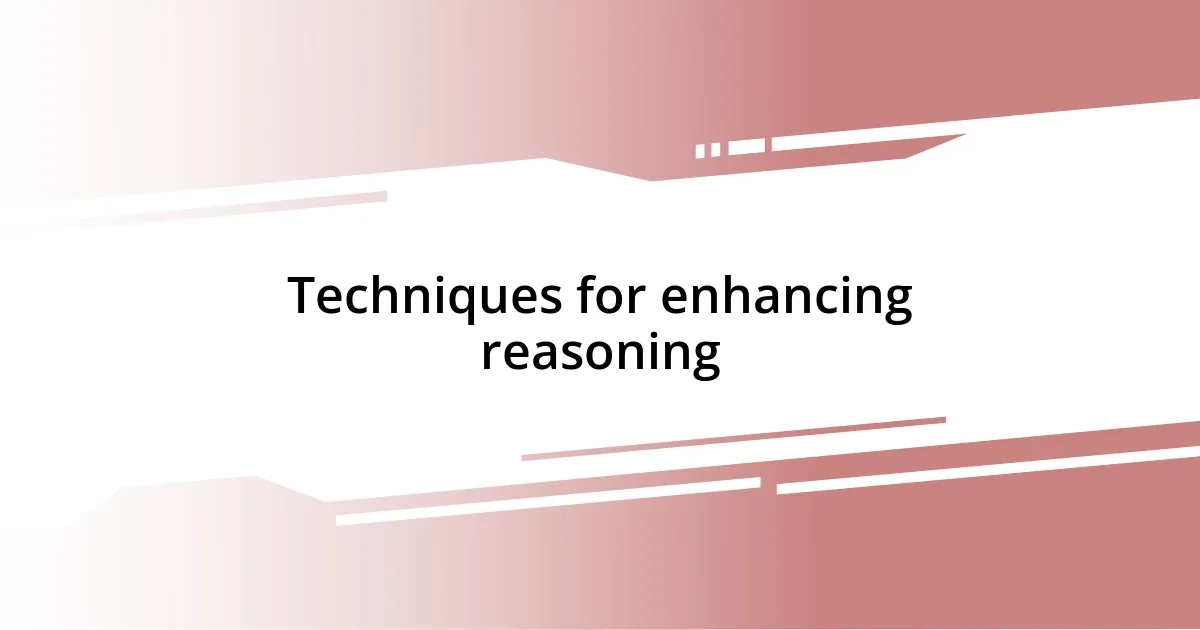
Techniques for enhancing reasoning
To deepen reasoning skills, I’ve found that engaging in regular practice is key. For instance, I started solving logic puzzles and riddles. They challenged my brain and forced me to think critically about potential solutions. Every time I completed one, I felt a sense of achievement, almost like a mental workout. Have you tried tackling a puzzle lately? It can really sharpen your thinking!
Here are some techniques that have worked for me:
– Engage in debates: Discussing various topics can stretch your thinking and expose you to different perspectives.
– Read critically: When approaching a text, I learned to question the author’s claims and note the evidence presented.
– Journaling thoughts: Putting my thoughts on paper allowed me to organize my reasoning and identify gaps in my logic.
– Mind mapping: I began visually organizing my ideas, which helped clarify my thought processes and connections between concepts.
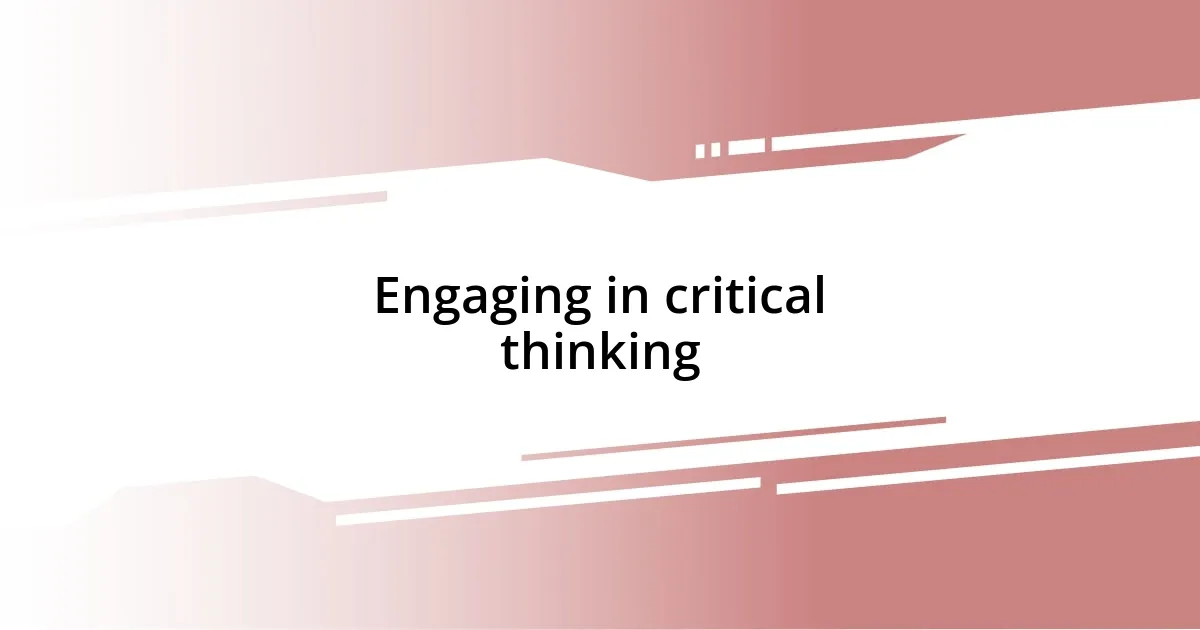
Engaging in critical thinking
Engaging in critical thinking is a vibrant exercise that I truly enjoy. One evening, I found myself engrossed in a heated discussion with a friend about a movie’s underlying themes. As we dissected the plot, I realized how critical thinking allowed me to consider motives, audience emotions, and symbolic elements. It was empowering to ask myself, “Why did that character make that choice?” instead of simply enjoying the entertainment. Have you ever watched a film and felt compelled to analyze it deeply? It can turn an ordinary movie night into a stimulating intellectual experience.
Another avenue I explored is questioning assumptions—my own and those of others. When confronted with common beliefs, I’ve made it a habit to pause and ponder their validity. For example, during a work meeting, someone suggested a familiar approach to a recurring problem. Instead of accepting it at face value, I probed, “What if there’s a different angle we haven’t considered?” This not only prompted a richer discussion but also highlighted my growing critical lens. Have you noticed how a simple question can open up entirely new pathways of thought?
Lastly, I began practicing reflective journaling, which has drastically changed my thought process. Each night, I jot down insights or dilemmas I faced during the day. It’s fascinating to unravel my thought patterns and sometimes shocking to see any biases I unwittingly harbor. One night, I wrote about a disagreement I had with a coworker, and through reflection, I realized my emotional response clouded my reasoning. Recognizing this helped me approach future discussions more calmly. Have you ever taken a moment to reflect on your conversations? It can be a game-changer for personal growth.
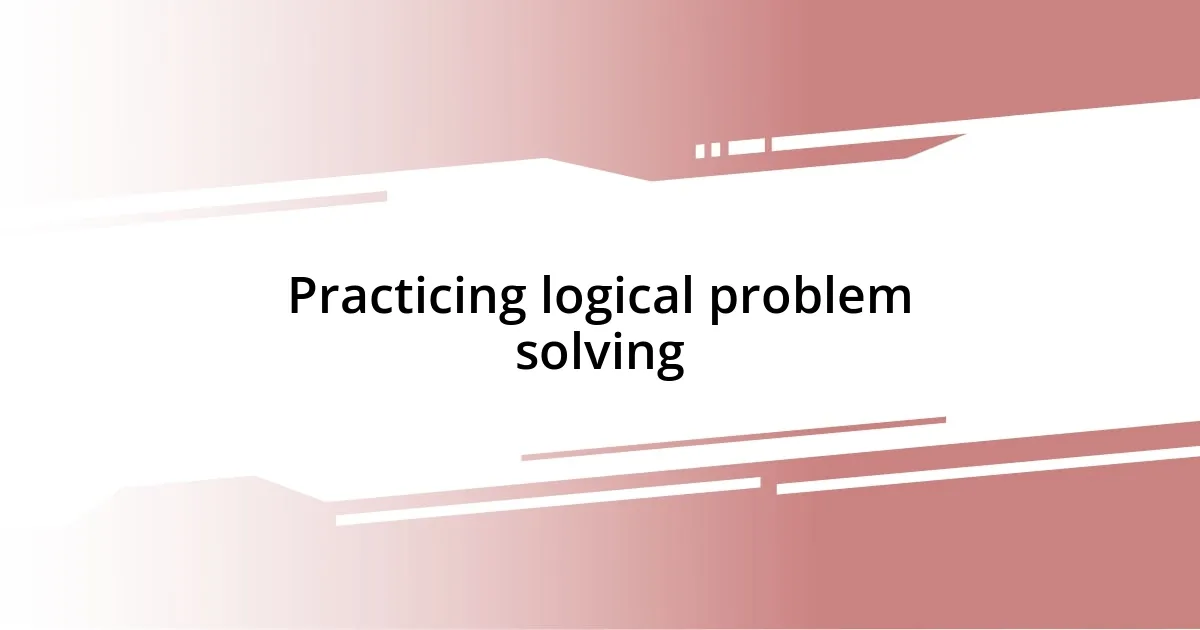
Practicing logical problem solving
Practicing logical problem-solving has been an eye-opening journey for me. I remember one rainy afternoon, I stumbled upon a complex Sudoku puzzle. As I immersed myself in it, I felt the familiar thrill of piecing together numbers like a detective. With each number I placed correctly, my confidence surged. Have you ever experienced that satisfaction that comes from cracking a tough puzzle? It’s like unlocking a door to a world of clarity.
I also embraced the power of games designed for critical thinking. For instance, I started playing chess, not just for fun, but as a means to sharpen my logical reasoning. Every move requires foresight and strategy, pushing me to think several steps ahead. It taught me the importance of evaluating not just my position, but anticipating my opponent’s moves. What strategies do you think could help you see multiple outcomes in a scenario?
One of the most impactful techniques I’ve applied is collaborative problem-solving. I often gather with friends for a game night where we tackle escape room-style challenges. The thrill of working together to unlock clues incites a rush of adrenaline and teamwork. It’s fascinating how different perspectives can illuminate paths I hadn’t even considered. Have you ever tackled a challenge in a group setting that completely changed your viewpoint? This experience not only sharpens my reasoning skills but creates lasting bonds through shared victories.
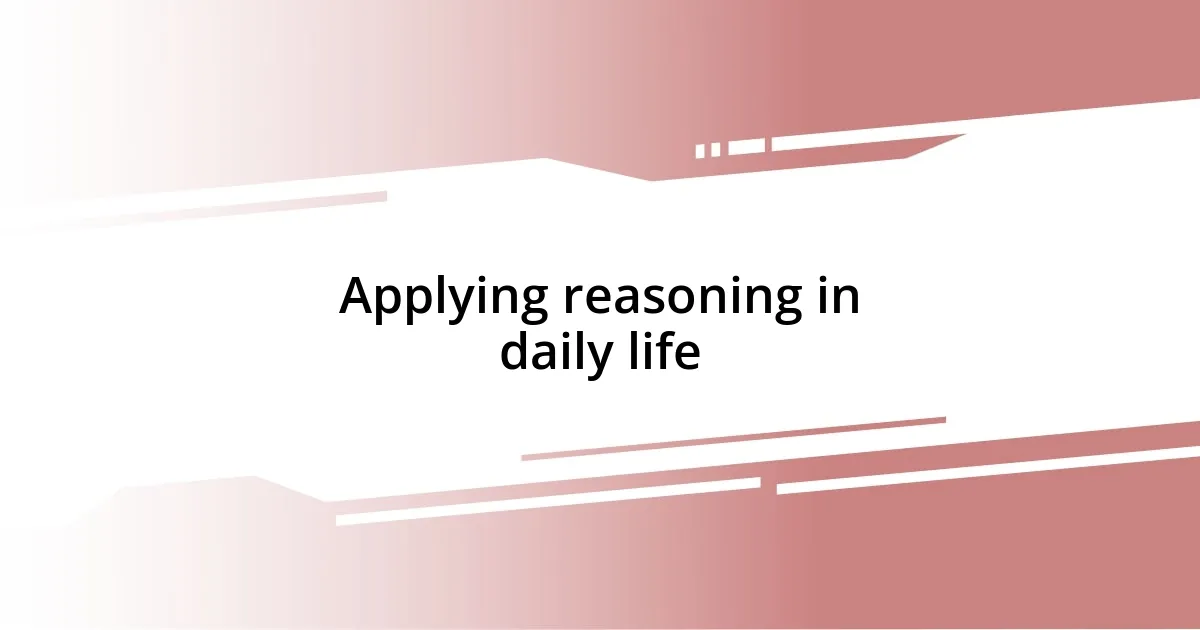
Applying reasoning in daily life
Applying reasoning in daily life has transformed how I navigate everyday challenges. For example, when deciding on which groceries to buy, I find myself weighing the pros and cons of health versus cost. I’ve started asking, “What ingredients will improve my wellbeing without breaking the bank?” This simple reframing helps clarify my priorities while making healthier choices.
Another instance that comes to mind is during my morning commute. I often encounter unexpected traffic jams, which previously would frustrate me. Instead of letting that stress consume me, I now reflect on what I could do differently. I consider alternative routes or even how to use that time to listen to an enlightening podcast. Have you ever turned an annoying delay into an opportunity for growth? It’s a subtle shift but one that greatly improves my mood.
Even in social situations, reasoning plays a role. I remember a recent gathering where opinions clashed on a controversial topic. Instead of jumping into the fray, I opted to listen first. By assessing the various perspectives, I asked a thought-provoking question that invited deeper discussion. “What experiences led you to feel that way?” This approach not only fostered a respectful dialogue but allowed me to grasp a broader view of the issue. How often do we pause to consider others’ experiences before voicing our own? It can open the door to richer conversations and understanding.
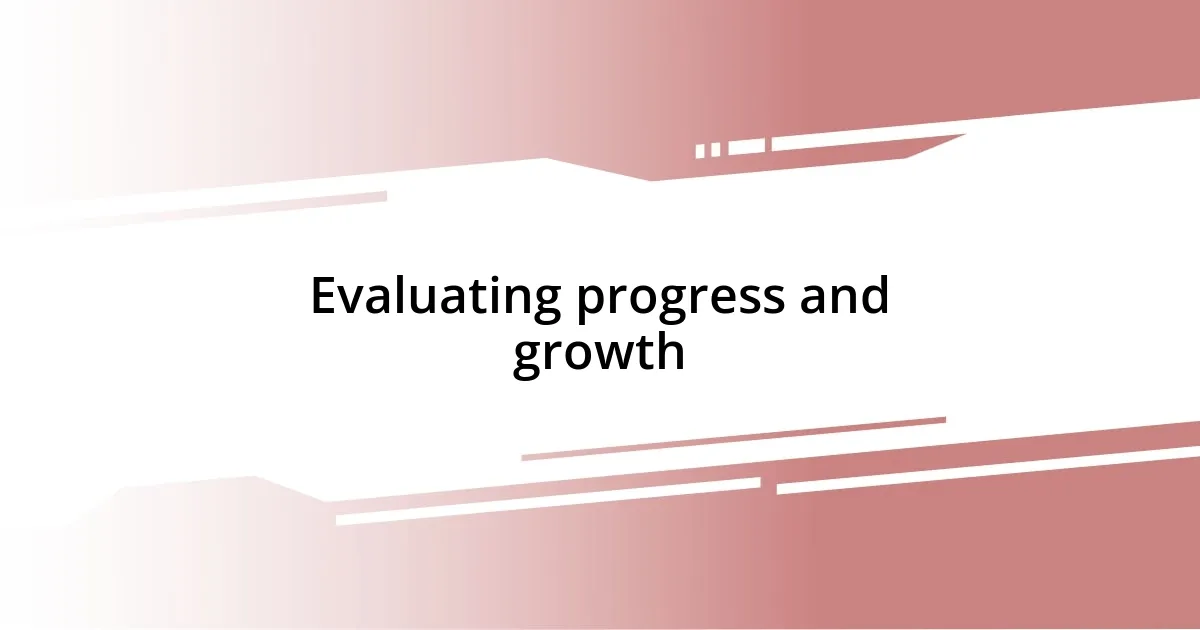
Evaluating progress and growth
Evaluating my progress in reasoning skills has been both enlightening and rewarding. I often take a step back to reflect on how far I’ve come. For example, I recall the first time I tried to dissect a complex argument in a debate. Initially, my thoughts felt jumbled, but now I can structure my points more coherently. Doesn’t it feel gratifying when you recognize your own growth?
As I track my development, I keep a journal highlighting specific instances where I applied my reasoning skills. I realized that were pivotal moments—like the time I volunteered to lead a community project. I had to weigh different opinions and integrate them into a cohesive plan. Looking back, I appreciate that the discomfort of navigating differing views strengthened my ability to synthesize information. Have you ever documented your journey? It can bring clarity and motivation.
One insightful practice I’ve adopted is seeking feedback from others. Sharing my thought processes with friends or mentors allows me to view my reasoning from different angles. I’ll never forget a conversation with a mentor who challenged my perspective on a project proposal. Their insights prompted me to rethink my approach, ultimately leading to a more robust solution. How valuable do you think outside perspectives are in your own journey of growth? Embracing constructive criticism has undoubtedly been a game-changer for me.
